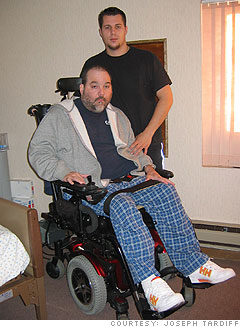
Raul Medina and Joe Tardiff
Medina, who's also a minister, owns two properties, his residence and one he bought for a Moorestown, N.J., church to provide shelter for the homeless.
"My husband made the bank aware of the situation," says Amber, "and asked if there were options to modify the loan. Everybody he talked to gave him a different story. By the time he was able to get through to the people who might be able to help, nine months had passed."
"It was extremely frustrating," adds Joe, "getting bounced around from department to department and get the wrong person again and again."
The lender of Medina's residential property delayed for six months in responding to an offer of a short sale - one in which the sale price is less than the borrowers owe and the bank agrees to forgive the difference. The price was $335,000, the original mortgage balance, but the lender wanted all their fees - $62,000 - paid as well.
"They finally agreed to a short sale but that was after calling and faxing their office daily and begging them to work with us so [Medina] didn't have a foreclosure on his hands," said Amber. "They're getting exactly the same amount of money they would have had they agreed to refinance two years ago."
That was bad strategy for the bank. Prices fell through that half year of dithering and missed payments, and expenses added to the lender's losses.
Medina owes about $280,000 on the other house he owns, in Medford N.J., and it needs a $75,000 overhaul to make it habitable for him. His insurance company offered to kick in $120,000 to make the property suitable for the wheelchair-bound Medina, according to the Tardiffs, if the lender would work out a modification. It wouldn't.
"After seven months of roadblocks, wrong numbers, voice mails to people who `no longer work for the company' I was told that the lender does not offer any loan modifications," said Amber.
Medina's options boil down to keeping the house but pay all the outstanding bills within 18 months or arranging another short sale. Since he gets just $1,000 a month from Social Security and $1,100 a month rent from an apartment in the house and a small housing allowance from the church, he can only afford the original mortgage payment; he couldn't afford to add the missed payments to that and pay it back in a year and a half.
"Based on our experience with two different mortgage companies trying to help a paraplegic minister, the lenders are less than willing to help people struggling to get by," said Amber Tardiff.
NEXT: Richard and Pati Kays - Stuart Fla.
